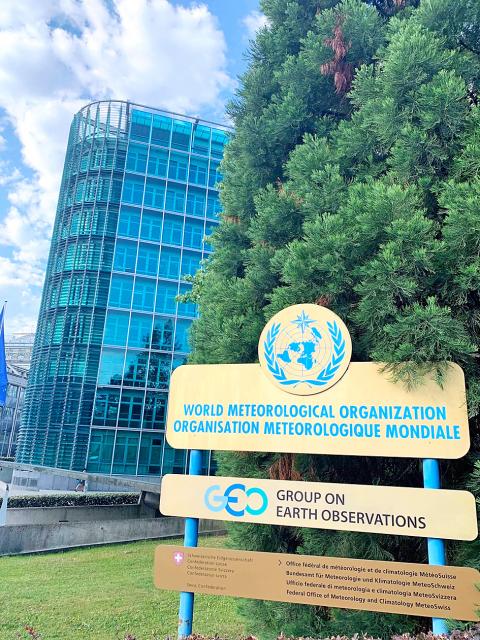Taiwanese experts were yesterday abruptly blocked from attending the World Meteorological Congress in Geneva, Switzerland, reportedly due to Chinese pressure.
Weatherrisk Explore Inc (天氣風險管理開發) general manager Peng Chi-ming (彭啟明) and Civil IoT Taiwan information platform convener Lu Chung-chin (呂忠津) were denied entry to the conference room that hosted the congress, which is held every four years, Civil IoT Taiwan wrote on Facebook. It began on Monday last week and runs through Friday.
Peng and Lu had earlier this week joined the meeting as civic observers, but their accreditation was abruptly canceled, it wrote, adding that it suspects that World Meteorological Organization (WMO) Assistant Secretary-General Zhang Wenjian (張文健) was behind the move.

Photo courtesy of Peng Chi-ming
“It is very uncomfortable to encounter such a situation on the spot in Geneva, just as a healthy person is suddenly told that he has cancer,” Peng wrote on Facebook on his way back to Taiwan.
He has Chinese friends working in the profession and they can respect each other’s values, Peng said, adding that he believes the “irrational move” was made by just a few people.
He wants to tell whoever is responsible that “although you have some power, you are losing people’s respect,” Peng wrote.
Taiwan’s representative office in Geneva had asked like-minded countries to express concern over a likely incident to the WMO, but the organization still succumbed to Beijing’s pressure, the Ministry of Foreign Affairs said in a statement.
It condemned Beijing for impeding Taiwanese experts from participating in international exchanges in professional affairs and expressed regret over the WMO’s failure to stand firm.
The Chinese government has been imposing its fictitious “one China” principle on global organizations and businesses to the level of insanity, and does not even spare international cooperation in health, climate and disaster prevention, it said.
It would continue demanding that UN-affiliated agencies rectify their biased measures against Taiwanese, the ministry added.
Chinese obstructionism is increasingly felt in global meetings on atmospheric sciences, National Taiwan University Department of Atmospheric Sciences chair Lin Po-hsiung (林博雄) said.
He attended the WMO-backed Technical Conference on Meteorological and Environmental Instruments and Methods of Observation in Belgium in 2012, but did not sign up for its last year’s edition, as Taiwan’s country code has disappeared from its application system, so he only sat in on some speeches, instead of attending as a Chinese, he said.
Taiwan has been filing its weather data with WMO’s Global Telecommunication System through an information exchange center in Tokyo, instead of Beijing, he said.
Information gathered through the Formosat-3 and Formosat-7 satellite constellations — which are Taiwan-US collaborative programs — is processed through the US, he said.
Taiwan should continue working with the US or Europe in atmospheric observations, as well as promoting joint weather studies and disaster prevention with diplomatic allies and Southeast Asian countries, Lin said.

Intelligence agents have recorded 510,000 instances of “controversial information” being spread online by the Chinese Communist Party (CCP) so far this year, the National Security Bureau (NSB) said in a report yesterday, as it warned of artificial intelligence (AI) being employed to generate destabilizing misinformation. The bureau submitted a written report to the Legislative Yuan in preparation for National Security Bureau Director-General Tsai Ming-yen’s (蔡明彥) appearance before the Foreign Affairs and National Defense Committee today. The CCP has been using cognitive warfare to divide Taiwanese society by commenting on controversial issues such as Taiwan Semiconductor Manufacturing Co’s (TSMC, 台積電) investments in the

HELPING HAND: The steering committee of the National Stabilization Fund is expected to hold a meeting to discuss how and when to utilize the fund to help buffer the sell-off The TAIEX plunged 2,065.87 points, or 9.7 percent, to close at 19,232.35 yesterday, the highest single-day percentage loss on record, as investors braced for US President Donald Trump’s tariffs after an extended holiday weekend. Amid the pessimistic atmosphere, 945 listed companies led by large-cap stocks — including Taiwan Semiconductor Manufacturing Co (TSMC, 台積電), Hon Hai Precision Industry Co (鴻海精密) and Largan Precision Co (大立光) — fell by the daily maximum of 10 percent at the close, Taiwan Stock Exchange data showed. The number of listed companies ending limit-down set a new record, the exchange said. The TAIEX plunged by daily maxiumu in just

INVESTIGATION: The case is the latest instance of a DPP figure being implicated in an espionage network accused of allegedly leaking information to Chinese intelligence Democratic Progressive Party (DPP) member Ho Jen-chieh (何仁傑) was detained and held incommunicado yesterday on suspicion of spying for China during his tenure as assistant to then-minister of foreign affairs Joseph Wu (吳釗燮). The Taipei District Prosecutors’ Office said Ho was implicated during its investigation into alleged spying activities by former Presidential Office consultant Wu Shang-yu (吳尚雨). Prosecutors said there is reason to believe Ho breached the National Security Act (國家安全法) by leaking classified Ministry of Foreign Affairs information to Chinese intelligence. Following interrogation, prosecutors petitioned the Taipei District Court to detain Ho, citing concerns over potential collusion or tampering of evidence. The

‘COMPREHENSIVE PLAN’: Lin Chia-lung said that the government was ready to talk about a variety of issues, including investment in and purchases from the US The National Stabilization Fund (NSF) yesterday announced that it would step in to staunch stock market losses for the ninth time in the nation’s history. An NSF board meeting, originally scheduled for Monday next week, was moved to yesterday after stocks plummeted in the wake of US President Donald Trump’s announcement of 32 percent tariffs on Taiwan on Wednesday last week. Board members voted to support the stock market with the NT$500 billion (US$15.15 billion) fund, with injections of funds to begin as soon as today. The NSF in 2000 injected NT$120 billion to stabilize stocks, the most ever. The lowest amount it